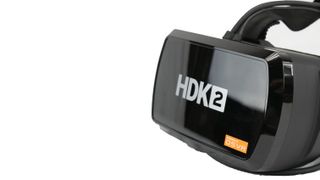OSVR Hacker Developer Kit 2 Review
Why you can trust Tom's Hardware
Conclusion

Last summer, when OSVR launched the HDK2, purchasing that headset made good sense for developers. Those who wanted a more affordable option than the $800 HTC Vive or $600 Oculus Rift could pick up a $400 OSVR kit and start working on VR games at the same display resolution as the two pricier enthusiast-oriented headsets.
The landscape is a lot different today, though. In December 2016, Oculus finally released its Touch controllers and altered the status quo. Suddenly, the emphasis switched from gamepad-oriented experiences to motion control-enabled apps. A lack of motion controls on the OSVR platform severely diminishes its viability as a development environment for future content.
Oculus further eroded the HDK2’s value proposition in March 2017 when it knocked $100 off the Rift, taking its price down to $500. Unless you’re in dire straits (don’t buy VR if you're short on cash), spending an extra $100 on the Rift is well worth your money. The difference in comfort alone justifies Oculus' premium.
Unfortunately, I can’t recommend the OSVR HDK2 to simulation fans, either. High-end sim hardware is incredibly expensive. It’s not hard to spend a couple thousand dollars on a comprehensive racing cockpit or flight simulation system, and top-tier kits with hydraulic force feedback mechanisms can cost tens of thousands of dollars. Even entry-level racing wheels and HOTAS setups cost hundreds of dollars. If you’re willing to spend that kind of money on a specialty peripheral, spring for the VR HMD that offers a premium experience.
The Open Source VR concept is an excellent idea in the same way that an open source operating system like Linux is appealing. The concept of an open hardware platform that you can customize to fit your needs sounds great until you realize that, without a well-defined set of guidelines, the platform is destined to sparse support. Most developers just want an ecosystem they can use to deploy their wares.
The OSVR concept is wonderful for companies like MindMaze that want to build their own hardware. Ultimately, though, an accessory can only succeed when there are customers buying into the product. Any dev hoping to make money in this business has to turn to the platforms gamers have at home. So even if you build your prototype with an OSVR HDK, you’ll end up selling the final design into the worlds of HTC's Vive, Oculus' Rift, or both.
MORE: Best Virtual Reality Headsets
MORE: All Virtual Reality Content
MORE: Virtual Reality Basics
Stay on the Cutting Edge
Join the experts who read Tom's Hardware for the inside track on enthusiast PC tech news — and have for over 25 years. We'll send breaking news and in-depth reviews of CPUs, GPUs, AI, maker hardware and more straight to your inbox.
Kevin Carbotte is a contributing writer for Tom's Hardware who primarily covers VR and AR hardware. He has been writing for us for more than four years.
-
bit_user Thanks for taking the time & effort to review it.Reply
An interesting counterpoint would probably be this Amazon customer's review:
https://www.amazon.com/gp/customer-reviews/R32VP1Z15K5MBW/ref=cm_cr_dp_d_rvw_btm?ie=UTF8&ASIN=B01HDUVIZ0
